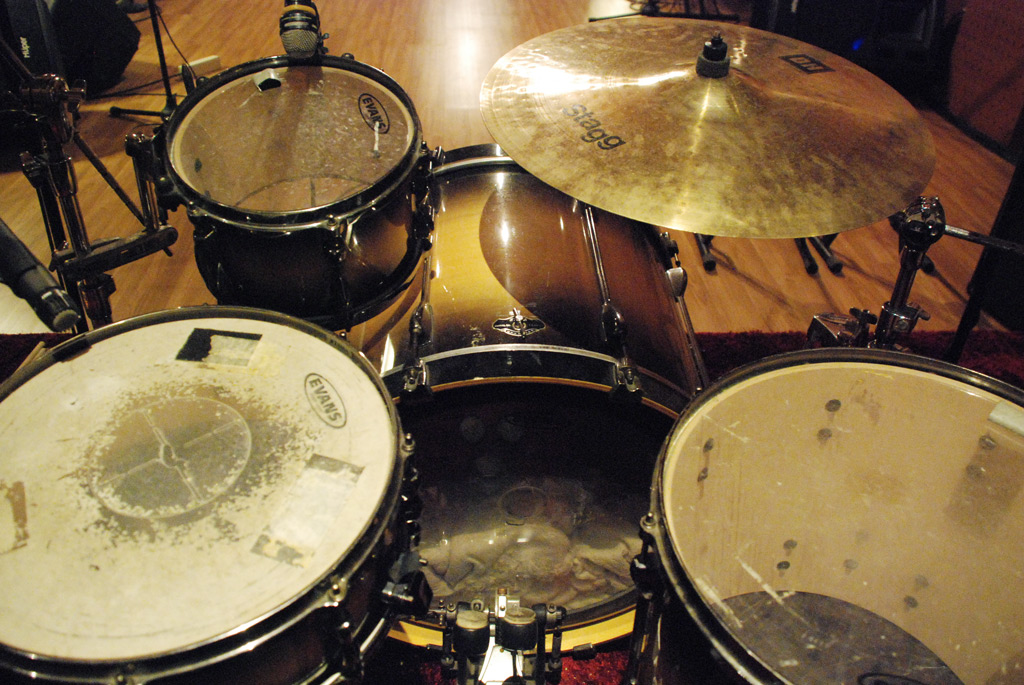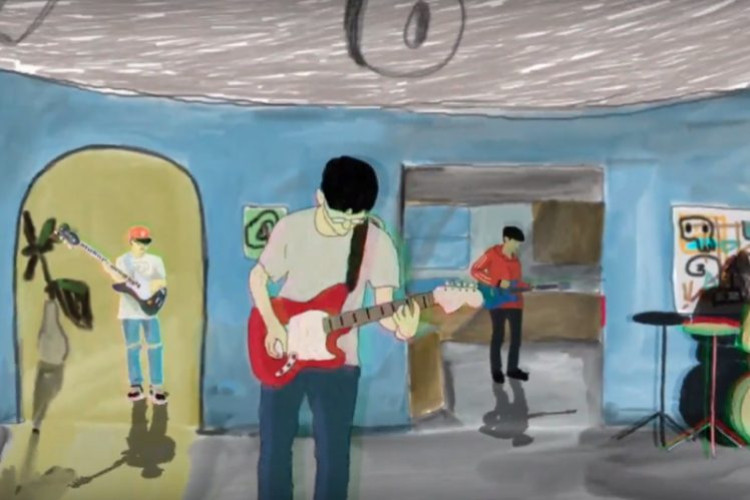Cinematic Music with Mondo Gascaro
Muhammad Hilmi (H) talks to musician and producer Mondo Gascaro (M).
by Ken Jenie




















H
As a musical figure, what were the first songs/music that you remember had an impact on you?
M
I don’t remember exactly what song I first heard, but two songs that I remember listening to early on were “Bengawan Solo” and Ismail Marzuki’s “Sabda Alam,” the Rafika Duri version. I heard both of those songs from my grandmother, who used to play them on the piano.
H
Do you come from a musical family?
M
No, not really. My grandmother enjoyed playing the piano and painting, while my father used to sing in a band called the Cekings – he enjoyed listening to Nat King Cole. My father owned a Japanese karaoke bar – the first in Indonesia – so there was music everyday in my house.
H
The music you create has an atmosphere – it is very cinematic. How did it become this way? Did you purposefully composed it that way or did it happen naturally?
M
I believe it happens naturally because I love film and cinema. My aspiration other than music is making a film. Film is an art form that can represent life and all of its elements, and what I cannot experience in real life can be expressed through films.
Music works similarly. Perhaps my music is cinematic because I can adapt elements… for example, ‘noir’ – something that can be presented through film as well. Aside from making my own music, I also do scoring.
Film scores also influence my music. For example, Taxi Driver’s soundtrack was by Bernard Hermann, and his music can describe 1976 New York City. Although I have never visited New York, his music takes me there – I try to bring this “journey” in my music as well. I would like to, for example, take you to Brazil with my music. I would like to translate what I visualize in in my head into music.
H
Is this interest in film what brought you to compose for films?
M
Yes, that was probably what influenced me to do so.
H
How did you become involved in film scoring? Were you scoring or performing in Sore first?
M
I believe I was in Sore first, although both sort of happened at the same time. I actually have made a score for a film that never went into production. My friends and my siblings wanted to make an animated film, and I made the score, but the film never happened (laughs).
When we [Sore] were recording our first album, Centralismo, we were invited to contribute a song for Janji Joni, the Joko Anwar film. The music directors were Age and David Tarigan. We made “Funk the Hole” and that was my first ever contribution to film.
Sore’s Centralismo was then released, and me, Aghi Narottama, and Bemby Gusti were invited by Kalyana Shira Films to score Berbagi Suami (Love For Share). That’s how it began, and, Alhamdulillah, it has continued until now.
H
What is your opinion on Indonesian scoring right now? Films such as Badai Pasti Berlalu and G30S PKI had seminal soundtracks, but we don’t really hear much about today’s film scores.
M
Actually, I believe it has gotten much better now. The quality of the score has a lot to do with the development of production quality. If the film is written well and the production is good, then the music will stand out as well because music plays a supporting role in the film.
In my opinion, though, we don’t have the ideal facilities for film scoring right now. Most of the film scores use softwares, there aren’t a lot of films here who uses live instruments or full orchestras yet.
H
You are also a music producer. As a person who started as a musician and became a producer, what would you say is the role of a producer in helping an artist/band?
M
It differs for each project. A producer’s role, in my opinion, is to guard the recording process, so it can reach the intended goals. The responsibilities include its production, timeline schedule, the sound and music direction. Regarding how large a producer’s role is in shaping the actual sound of the recording – it differs. There are producers who are dominant. For example, Quincy Jones creates his product through the artists he works with.
H
With the technology making it very accommodating for musicians – they can now record, produce, and distribute their music from home – do musicians need producers?
M
Having a producer really depends on what the artist needs. If the artist/band can act as a producer, they really wouldn’t need one. Most bands, though, focus on exploring their music, and the producer would help them achieve what they sonically want in a recording.
H
One of the important element that made Aksara Records such a success during its time was having producers such as David Tarigan and yourself that helped shape its distinct character. Right now, it seems that we do not have people that can help musicians reach their potential on a recording.
M
One of the reasons Aksara flourished and had character was because of its A&R – which was David Tarigan. He would listen to the raw demos, brainstorm ideas with the bands. For example, White Shoes and the Couples Company’s Vakansi album had African elements in the music, which was perhaps the result of David Tarigan’s brainstorming with the group.
H
You have produced several albums for different artists. Any insights you can share about producing them?
M
Each project offered its own unique character and challenges. Payung Teduh is a band with a specific format of instrumentation and sound, and my challenge there was to optimize and reach the ideal sound as a quartet, which consisted of drums, contra bass, acoustic guitar, and guitarlele. On top of the instrument is a strong vocal character, which must sound intimate on a recording. My contribution must be balanced- enough to bring the best of their music, but not overwhelming, that would change the group’s character.
H
What was the reason you and your wife decided to create the Ivy League music label?
M
Like you mentioned before, although musicians today create great music and have the ability to record as well as produce on their own, there isn’t an entity that nurtures them. That and there isn’t a label that is concerned about the A&R facet.
Also, many musicians do not know how to distribute their music to the public aside from social media. There other channels that can help introduce their music. This is the main reason why we started Ivy League Music.
Aksara was an independent label that used conventional major label methods of promotion and marketing. Those methods are no longer effective, most labels focus mainly on production and distribution, and very little to none in terms of promotion.
Sarah and I believe that we should start a label that have all the elements of a record label, but use methods that are effective today – we must have flexibility.
H
As a solo artist, what would you like to present with your upcoming album? Did you create this album because you haven’t done a personal project for a long time?
M
Oh no, I do music all the time – I make music or arrangements at home just for fun. I have planned to create a solo project for a long time, and when I left Sore I had a lot of material ready, and it just needed the right time to have it properly recorded.
This year was the year I finally got to delve in my solo project. I released my first single and am about to release another one next month, and will finish the production of the album for a 2015 release.
This album is a part of my musical journey. I would like to explore music with the conditions I live with at the moment, with the spirit that I have today. There are many new ideas I would like to explore and old ideas I never had the chance to explore.
H
This includes being a father?
M
Definitely, being a father and a husband.
H
Conceptually, what will the music for your album be like?
M
A lot of surprises happen during production. Generally speaking, my exploration in this album is geared more towards songwriting. I would like to explore traditional songwriting, golden age radio friendly songs that doesn’t really exist nowadays. Artists such as Paul Simon and Todd Rundgren made hits that were thoughtful, and explorative.
H
The album is coming out next year?
M
Yes, God willing.
H
Any upcoming projects aside from your album we should be aware of?
M
The next artist I will be producing is Karon N Roll. They are now a trio, and their music is geared more towards psychedelia. It’s not the type of music I am used to producing, but I like it so I accept that challenge.
location:
Streight Studio
Jl. H. Junaedi no. 8B
Cipete, Jakarta Selatan
ph: 081286065215 / 0816955061











